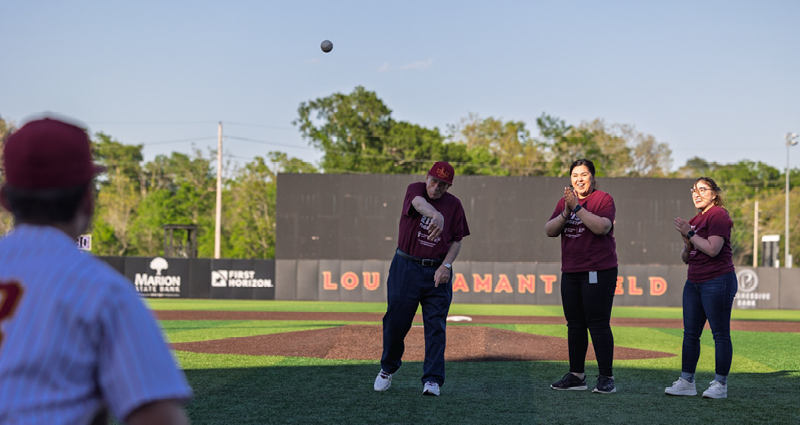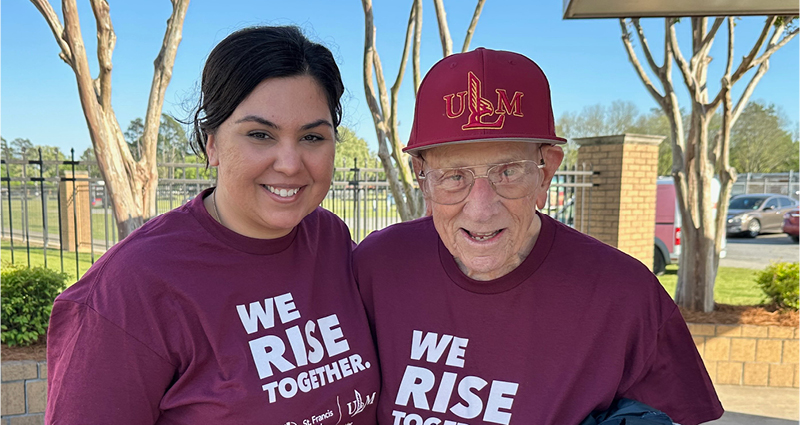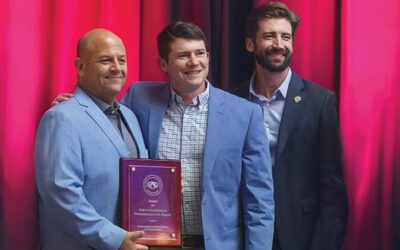At 86, Coach Lou St. Amant still throws out the first pitch, still shows up for daily Mass and still inspires everyone who knows him.
But just a few months ago, he suffered a stroke following a cardiac procedure which could have benched him for good. Thanks to quick action, expert care at St. Francis Medical Center, and a bit of that Coach St. Amant grit, he’s back on his feet and back to the life he loves.
A Heart Procedure That Turned into Something More
Coach St. Amant was undergoing an elective heart catheterization following an abnormal stress test, something his doctors recommended due to his history of heart issues. The procedure itself went smoothly, but not long afterward, things took a sudden turn.
He remembers waking up in his hospital room and not recognizing anyone. His speech was off. “It hurt my comprehension,” he says. “I couldn’t talk right.”
Friends noticed he was unusually quiet, and his nurse immediately picked up on red flags: weakness in his right arm and difficulty speaking. She activated a stroke alert, triggering a rapid response from the hospital’s stroke team.
A Stroke, a Clot and a Rapid Response
St. Francis Medical Center’s stroke team, including Pamraj Sharma, MD, neurologist and stroke program medical director, quickly took action.
“Because it was unclear when his symptoms began, an MRI was used to determine the acuity of his stroke per WAKE UP protocol, which is a novel way to determine whether strokes are amenable to treatment when the patient’s last normal time is unknown,” Dr. Sharma says.
The MRI of his brain did show an evolving stroke, and Dr. Sharma consulted with Coach St. Amant’s power of attorney, securing consent to begin thrombolytic therapy, a clot-busting medication used to treat evolving strokes.
“They found a clot and went in to treat it,” Coach St. Amant says. “After that, everything changed. I couldn’t believe how much better I got, just in a few days.”
He was transferred to the Intensive Care Unit for close monitoring.
From Rehab to Recovery
After his stroke, Coach St. Amant spent a short time in a nursing home for continued care. Then came rehab, speech therapy sessions focused on helping him regain comprehension and communication. Slowly but surely, the words came back. And so did his energy.
Though he suffered a stroke, he has come a long way. He follows up regularly with his primary care doctor and manages some mild anemia with daily medication. “Other than that, everything’s good,” he says. “I’ve been good ever since.”
Recovery wasn’t without its hurdles. He underwent extensive testing, including upper and lower endoscopies and even swallowed a camera pill, to make sure there were no lingering concerns. Through it all, he stayed upbeat and focused on the goal: getting back to the life he loves.
A Coach’s Legacy
If you’ve lived in Northeast Louisiana for any length of time, you probably know the name Lou St. Amant. He played sports at LSU, coached for decades and served on the faculty at ULM. He even had the baseball field named after him, a lasting honor he’s deeply proud of.
“I coached football, basketball, baseball and refereed, too,” he says. “Been around this town a long time. I love it here.”
Though he lost his wife, Marilyn, in 2020, Coach St. Amant remains deeply connected to his community. He attends daily Mass at St. Francis and still goes to ball games as often as he can.
“That hospital, they took real good care of me,” he says. “Everybody was great.”

Ready for the Next Pitch
Just months after his stroke, Coach St. Amant threw out the first pitch during the April 11 University of Louisiana Monroe Baseball game against University of Louisiana Lafayette at Lou St. Amant Field. It’s a moment that means a lot, not just for him, but for everyone who knows what he’s been through.
“I feel good,” he says with a smile. “Even my temper’s good these days.”
Coach St. Amant’s story is a reminder that healing is possible, even after serious health setbacks and that life can still be full of purpose, connection and joy at any age.




